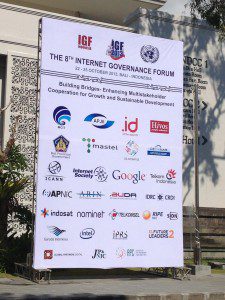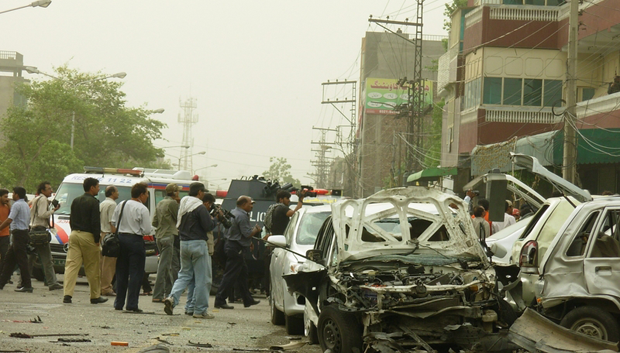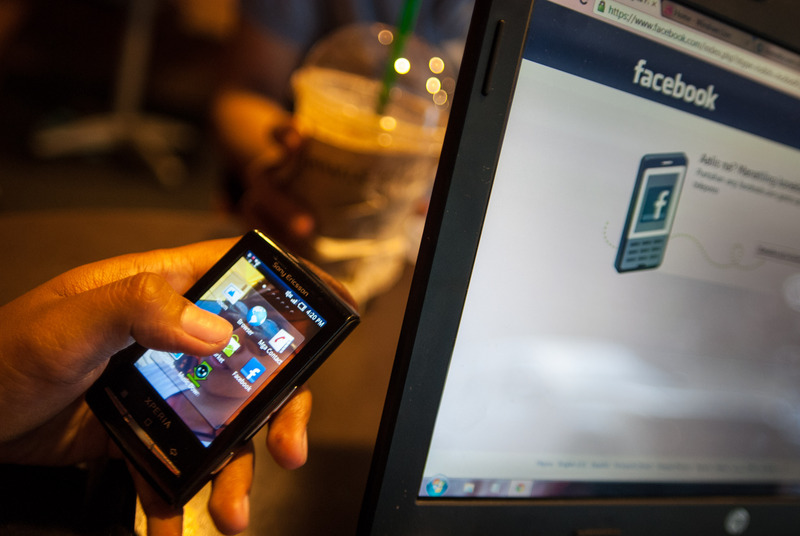22 Oct 2013 | Events
A workshop exploring the social and economic implications of national-level ICT legislation and regulation and looking into the impact of international telecom practices on human rights.
In partnership with Pakistan’s Centre for Social and Policy Analysis and the Global Network Initiative, an international selection of panelists present the particular issues at play in their own regional settings, including the nationalization and/or monopolization of telecom regimes, content filtering and take downs, and communications surveillance.
Including:
Ross LaJeunesse, Google, UNITED STATES
Seth Bouvier, US State Department, UNITED STATES
Zahid Jamil, CSPA, PAKISTAN
Claudio Ruiz, Derechos Digitales, CHILE
Donny Bu, ICT Watch, INDONESIA
Lisa Brunner, GNI, UNITED STATES
Mike Harris, Index on Censorship, UNITED KINGDOM
@IndexEvents – #IGF2013 #indexatigf
When: Thursday 24th October
Where: Internet Governance Forum 2013, Bali
22 Oct 2013 | Campaigns
Index on Censorship sent the following letter to Dalia Grybauskaitė, President of the Republic of Lithuania, and Herman van Rompuy, President of the European Council:
I am writing to you on behalf of 40 non-governmental organizations (listed below) and nearly 7000 individuals who have joined an online petition initiated by Index on Censorship calling on Europe’s leaders to place the issue of surveillance on the agenda for the European Council Summit in October.
It has been reported that the US and some European governments indiscriminately monitor emails, telephone conversations and websites that individuals visit. As the signatories of the petition, we believe that such mass surveillance of online communications is a violation of the right to freedom of expression and privacy.
We have noted that the European Council will be meeting on 24 and 25 October to discuss a number of important issues that the European Union is facing. Among them are discussions about digital economy, innovation and services; growth, competitiveness and jobs as well as the economic and monetary union. According to the agenda, the European Council Summit “may also address specific external relations issues in the light of developments on the international scene”.[1]
We believe that the nature of the revelations by the Guardian and other media outlets as well as the subsequent media reports on the issue make it important that the European Council Summit discusses the issue of mass surveillance programmes. The allegations of mass surveillance are very much in the public interest and as such necessitate a transparent discussion at the EU level.
Mass surveillance violates the fundamental rights that the European Union is built on, such as the right to privacy and freedom of expression.
The right to privacy is enshrined in Article 8 of the European Convention on Human Rights (ECHR) and in Article 7 of the EU Charter of Fundamental Rights (EU Charter). Similarly freedom of expression is protected by Article 10 and 11 of the ECHR and the EU Charter respectively. The obligation to respect, protect, fulfil and promote those rights is legally binding on all EU Member States and, since the adoption of the Lisbon Treaty, on the EU institutions.
We would be grateful if you could use your authority to put the issue of mass surveillance on the agenda of the forthcoming European Council Summit (24-25 October 2013).
Yours sincerely
Marek Marczynski
Director of Campaigns and Policy
Index on Censorship
On behalf of:
– Index on Censorship
– Amnesty International
– English PEN
– Article 19
– Privacy International
– Open Rights Group
– Liberty UK
– RSF – Reporters Without Borders
– European Federation of Journalists
– International Federation of Journalists
– PEN International
– PEN Canada
– PEN Portugal
– Electronic Frontier Foundation
– PEN Emergency Fund
– Canadian Journalists for Free Expression (CJFE)
– National Union of Somali Journalists
– Bahrain Centre for Human Rights
– Catalan PEN
– Centre for Independent Journalism (CIJ) – Malaysia
[1] Note from the General Secretariat of the Council to the Committee of Permanent Representatives/General Affairs Council – European Council (24-25 October 2013) – Annotated draft agenda, 23 September 2013, 12389/13; CO EUR-PREP 34, p. 3. http://register.consilium.europa.eu/pdf/en/13/st12/st12389.en13.pdf
22 Oct 2013 | News, Pakistan, Religion and Culture

In May 2010, terrorists attacked two mosques belonging to the Ahmadi community. Ninety-four people were killed and more than 120 were injured. (Photo: Aown Ali / Demotix)
As the Muslim festival of Eid ul Adha drew to a close last week, it left a bad taste in the mouth of several Pakistanis when they heard that those belonging to the Ahmadi community were stopped from performing the ritual of animal sacrifice because they are “non-Muslims”.
According to a news report by Express Tribune, police raided a house of an Ahmadi man in Lahore, Punjab, and took him into custody. Police released him only after Ahmadi community elders intervened, giving written assurances that the man will not perform a sacrifice.
“We have slid towards the deep,” said rights activist and filmmaker Feryal Gauhar, quoting Chilean poet Pablo Neruda, blaming the government for not taking action.
“The spiral is rapidly spinning out of control. We are reduced to being passive bystanders to the tragedy that is being played out by forces of obscurantism,” she said.
“I think it’s deplorable and yet another instance of official persecution of the Ahmadis,” said Zohra Yusuf. But she said it was unclear under which law the police took action. “This indicates that intolerance has seeped into the police force, particularly in the Punjab,” she said.
The spokesperson of the Ahmadiyya Jammat in Pakistan, Saleemuddin (who uses his first name) said: “The police should not have given into the pressure of a few hardliners; this only strengthens them further.”
While only two cases surfaced this year, last year, too, a couple of cases were reported. Many fear if not nipped in the bud, this could set precedence for the coming years.
To Pakistani journalist and rights activist Beena Sarwar the episode is reminiscent of Nazi Germany and the persecution the Jews faced. “It goes against the basic tenets of humanity and justice, and the Islamic principle of ‘to you your faith and to me, mine’.”
“Pakistan must, for its own sake, take a firm stand against any such vigilantism and witch-hunting and intrusion into citizens’ personal lives and faith,” Sarwar said.
Every year, Muslims from all over the world gather in Mecca, Saudi Arabia, and perform Haj, between the 8th to the 12th day of the Islamic month of Zil Haj. Among a series of rituals performed that date to the time of Prophet Abraham, is the sacrifice of animals — usually a goat or a sheep (although cows and camels are also slaughtered) and the meat is distributed among relatives and the less fortunate.
“Offering animal sacrifices, particularly on the blessed days of Eid-ul-Adha, is a quintessential Muslim practice that all Muslims deeply cherish. For police to strip Ahmadis of this precious right is a callous and cruel act,” responded Amjad Mahmood Khan, president, Ahmadiyya Muslim Lawyers Association, which is based in the United States, through an email exchange.
“Yes, it is a ritual performed by Muslims, and Ahamdis are not Muslims,” Qari Shabbir Ahmed Usmani, a cleric who lives in Chenab Nagar, Punjab, where 95 percent of its population belong to the Ahmadi faith.
While the Ahmadis, consider themselves Muslims, they believe that Mirza Ghulam Ahmad, a 19th century cleric, “was the messiah promised by God” which is unacceptable to all other Muslim sects.
In 1974, the state of Pakistan declared Ahmadis to be non-Muslims. According to Pakistan’s constitution, they cannot call themselves Muslims, are banned from referring to their places of worship as mosques and cannot sing hymns in praise of the Prophet Muhammad. There are between 2-5 million Ahamdis living in the country.
But Usman, who heads the International Kahtme Naboowat Momin, one of the several religious movements in Pakistan, that aims to protect the sanctity of Prophet Muhammad is not in favour of the banning Ahmadis from performing the sacrifice. “In Chenab Nagar, no Ahmadi was stopped carrying out the sacrifice,” he said.
This was confirmed by Aamer Mahmood, in charge of the press section of the Ahmadiyya Jammat, who lives in Chenab Nagar.
But strong armed tactics to scare the Ahmadis is not restricted to Punjab alone. In September, four Ahmadis were killed in Karachi for their faith, said Mahmood.
In addition, he said, over 60 Khatme-Naboowat Conferences were held on or around September 7 (the day Ahmadis were declared non-Muslims) across Pakistan. Mahmood said a hate campaign forms an integral part of the conferences. The followers are incited to kill Ahmadis as part of Muslim edict.
“Earlier a handful would be held, but this time there was a record number which shows state collusion in stoking anti-Ahmadi sentiment.” he said.
“They are lying,” said Usmani. “We are against every form of violence; they are badmouthing Islam. In fact, had that been the case, do you think there would have been a single Ahmadi still alive in Pakistan?” he said during a phone interview.
“I have before me scores of published press statements and edicts by various Khatme Naboowat leaders from various Urdu newspapers to kill us or openly threatening us to leave Pakistan,” Mahmood countered.
He said he has pamphlets listing the names and addresses of Ahmadi families alongside messages inciting murder.
According to Khan: “The extreme views of a certain militant segment of Pakistan have permeated state institutions and law enforcement. Until and unless the state of Pakistan recognizes that it is only Allah’s place to judge whether someone is a true and righteous Muslim, it will continue down a perilous path towards lawlessness and injustice.”
Gauhar said sadly: “Mohammad Ali Jinnah [the country’s founder] would not own this Pakistan.”
Meanwhile, in the United States, a Congressional-appointed bipartisan federal body yesterday urged President Obama to raise concerns about the “dire religious freedom situation” in Pakistan during their meeting.
“Given that President Obama and Sharif reportedly will be discussing how best to counter violent extremism, we urge the US to incorporate concern about freedom of religion into these conversations,” said Robert George, Chairman of the US Commission of International Religious Freedom.
“To successfully counter violent extremism, Pakistan must have a holistic approach that ensures that perpetrators of violence are jailed, and addresses laws that foster vigilante violence, such as the blasphemy law and anti-Ahmadi laws.
“For the sake of his country, the Prime Minister should be pressed to take concrete action,” George said.
Based on findings of United States Commission on International Religious Freedom (USCIRF), Pakistan represents one of the worst situations in the world for religious freedom, he noted.
“The violence extremists perpetuate threatens all Pakistanis, including Shias, Christians, Ahmadis, and Hindus, as well as those members of the Sunni majority who dare to challenge extremists,” he said.
This article was originally posted on 22 Oct 2013 at indexoncensorship.org
22 Oct 2013 | Comment, Digital Freedom, News

The question anyone who defends free speech gets asked most frequently is “Where do you draw the line?”
The announcement by Facebook today that it will allow users to post videos of beheadings is bound to raise that question.
So where do we draw the line? The answer is that it is nigh-on impossible, when discussing free speech, to take general positions on any specific kind of speech or content. One must always look at the context.
Facebook’s own statement reflects this:
“Facebook has long been a place where people turn to share their experiences, particularly when they’re connected to controversial events on the ground, such as human rights abuses, acts of terrorism and other violent events,” the company said in a statement.
“People share videos of these events on Facebook to condemn them. If they were being celebrated, or the actions in them encouraged, our approach would be different.”
This might sound frustrating, particularly when, as the Guardian’s Jonathan Freedland points out, you contrast it with Facebook’s oft-cited banning of pictures of breastfeeding women.
But the blocking of breastfeeding pictures illustrates exactly the problem with drawing arbitrary lines on free speech. One can see a certain logic behind not allowing pictures of bare breasts; Facebook doesn’t want its platform to be given over to soft and hard porn; but most adults realise that images of bare breasts are not necessarily pornographic. Facebook policy, by the way, is not to ban pictures of breastfeeding women. But they admit to making mistakes and removing content that should not be removed. They do have a blanket ban on nudity.
Not every video of extreme violence can be automatically categorised as “snuff”, and there is an argument that if one wants to discuss brutality, one must be able to see it. Perhaps in an attempt to counter claims that allowing beheading videos to be viewed would somehow create a market for them, Facebook has said it will not allow videos posted by people seeking to praise the content. This, in terms of the free speech argument, yet again raises questions about the use and abuse of the notion of “glorification of terrorism” laws. We’re back to attempting to draw lines.
Debates over what is and isn’t “acceptable” free speech will never go away. And we will never honestly establish where the “line” is. Any discussion should begin with the premise of free speech as an absolute, and, if necessary, tiptoe backwards cautiously from there.
This article was originally posted on 22 Oct 2013 at indexoncensorship.org



